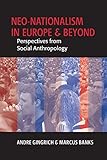Neo-nationalism in Europe and Beyond : Perspectives from Social Anthropology / ed. by Marcus Banks, Andre Gingrich.
Material type: TextPublisher: New York ; Oxford : Berghahn Books, [2006]Copyright date: ©2006Description: 1 online resource (312 p.)Content type:
TextPublisher: New York ; Oxford : Berghahn Books, [2006]Copyright date: ©2006Description: 1 online resource (312 p.)Content type: - 9781845451905
- 9781782386117
- 306.2094
- GN575 .N46 2006
- online - DeGruyter
| Item type | Current library | Call number | URL | Status | Notes | Barcode | |
|---|---|---|---|---|---|---|---|
 eBook
eBook
|
Biblioteca "Angelicum" Pont. Univ. S.Tommaso d'Aquino Nuvola online | online - DeGruyter (Browse shelf(Opens below)) | Online access | Not for loan (Accesso limitato) | Accesso per gli utenti autorizzati / Access for authorized users | (dgr)9781782386117 |
Browsing Biblioteca "Angelicum" Pont. Univ. S.Tommaso d'Aquino shelves, Shelving location: Nuvola online Close shelf browser (Hides shelf browser)

|

|

|

|

|

|

|
||
| online - DeGruyter Breast Feeding and Sexuality : Behaviour, Beliefs and Taboos among the Gogo Mothers in Tanzania / | online - DeGruyter Day of the Dead : When Two Worlds Meet in Oaxaca / | online - DeGruyter Ultimate Ambiguities : Investigating Death and Liminality / | online - DeGruyter Neo-nationalism in Europe and Beyond : Perspectives from Social Anthropology / | online - DeGruyter Researching Food Habits : Methods and Problems / | online - DeGruyter A Venetian Island : Environment, History and Change in Burano / | online - DeGruyter Flexible Capitalism : Exchange and Ambiguity at Work / |
Frontmatter -- Contents -- Acknowledgements -- Introduction Neo-nationalism in Europe and Beyond -- PART I: Concepts and Methods -- Chapter 1 Nation, Status and Gender in Trouble? Exploring Some Contexts and Characteristics of Neo-nationalism in Western Europe -- Chapter 2 Performing ‘Neo-nationalism’: Some Methodological Notes -- PART II: Case Studies from Western Europe -- Chapter 3 Imagined Kinship: The Role of Descent in the Rearticulation of Norwegian Ethno-nationalism -- Chapter 4 The Emergence of Neo-nationalism in Denmark, 1992–2001 -- Chapter 5 ‘At Your Service!’: Reflections on the Rise of Neo-nationalism in the Netherlands -- Chapter 6 Neo-nationalism and Democracy in Belgium: On Understanding the Contexts of Neo-communitarianism -- Chapter 7 ‘Being the Native’s Friend Does Not Make You the Foreigner’s Enemy!’Neo-nationalism, the Freedom Party and Jörg Haider in Austria -- Chapter 8 Neo-nationalism or Neo-localism? Integralist Political Engagements in Italy at the Turn of the Millennium -- Chapter 9 Regarding the Front National -- PART III: European Perspectives -- Chapter 10 ‘Healthy Native Soil’Versus Common Agricultural Policy: Neo-nationalism and Farmers in the EU, the Example of Austria -- Chapter 11 New Nationalisms in the EU: Occupying the Available Space -- PART IV: Global Perspectives -- Chapter 12 Neo-nationalism in India: A Comparative Counterpoint -- Chapter 13 Nationalism and Neo-populism in Australia: Hansonism and the Politics of the New Right in Australia -- PART V: Afterthoughts -- Afterthoughts -- Notes on Contributors -- Subject Index -- Name Index
restricted access online access with authorization star
http://purl.org/coar/access_right/c_16ec
By the early twenty-first century neo-nationalist forces have established themselves in a number of the world’s large regions and subcontinents. From Australia to South Asia, in Eastern and Western Europe, comparable parties and movements have positioned themselves in national parliaments and governments, with some considerable impact on state power. In contrast to right-wing extremist parties in the past, these recent movements mostly operate within legal parliamentary channels, using essentialized notions of local culture to mobilize against real and alleged threats to local identities of status, gender, religion, nationhood and ethnicity. Prompted by this near-simultaneous rise to political influence of more than a dozen apparently similar parties across Western Europe, this collection offers a range of European case studies with selected global examples, such as the Front National, the late Pim Fortuyn, India and the BJP, and Pauline Hanson and her One Nation Party in Australia. It takes up the theoretical and methodological challenges posed by this phenomenon and asks what distinctive contributions anthropology might make to its study.
Mode of access: Internet via World Wide Web.
In English.
Description based on online resource; title from PDF title page (publisher's Web site, viewed 25. Jun 2024)


